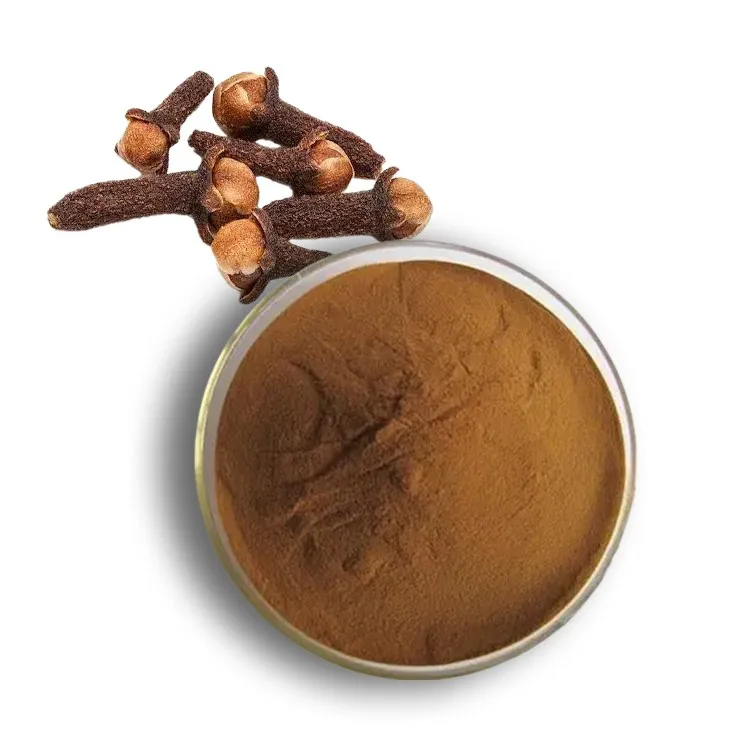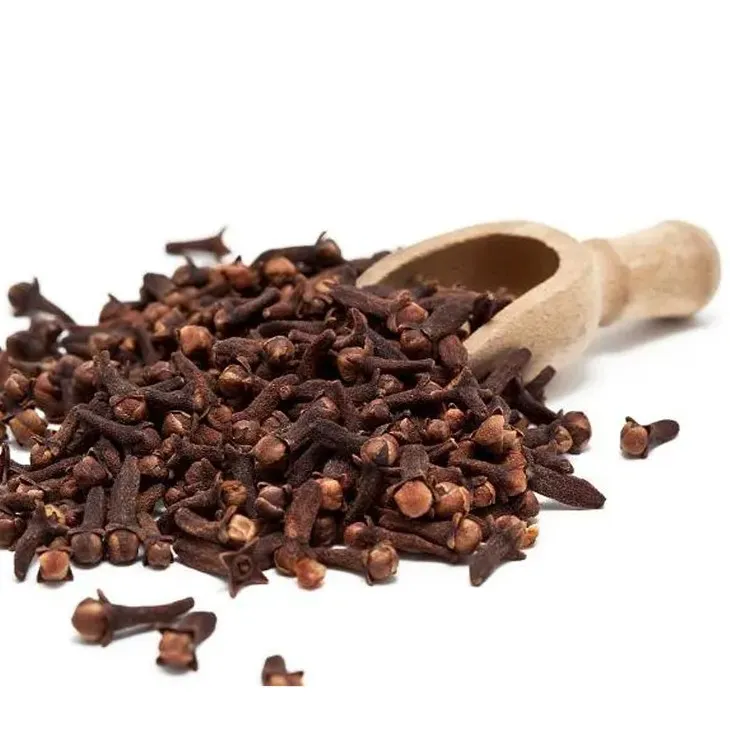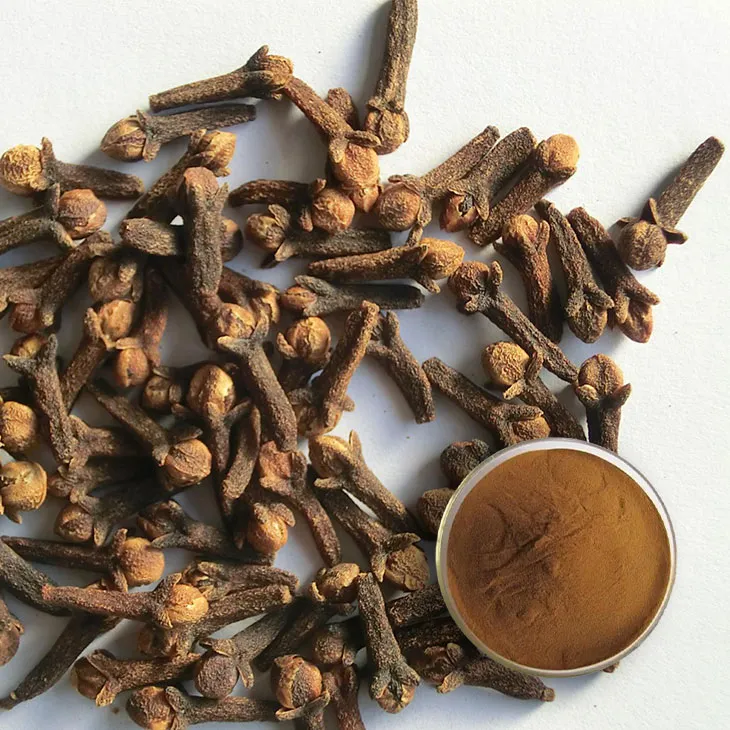- 0086-571-85302990
- sales@greenskybio.com
Flavor and Health: Culinary Uses and Recipes Featuring Clove Powder
2024-07-04

Introduction
Clove Powder is a remarkable spice that has been cherished in kitchens around the world for centuries. It is derived from the dried flower buds of the clove tree, Syzygium aromaticum. This small but mighty spice not only imparts a distinct and warm flavor to a wide variety of dishes but also offers several potential health benefits. In this article, we will explore the diverse culinary uses of Clove Powder, from enhancing the taste of sweet and savory dishes to its integral role in traditional recipes. We will also look at how to incorporate this spice into your cooking to create a delicious and healthy dining experience.

The Flavor Profile of Clove Powder
Clove powder has a complex and intense flavor. It is characterized by a warm, sweet, and slightly spicy taste. The flavor is both bold and aromatic, with a hint of bitterness that adds depth. When used in small amounts, it can enhance the overall flavor profile of a dish without overpowering other ingredients. It has a unique ability to blend well with both sweet and savory elements, making it a versatile addition to the kitchen pantry.

Culinary Uses in Sweet Dishes
Baked Goods
Clove powder is a wonderful addition to baked goods. In cakes, for example, it can add a warm and inviting flavor. A simple vanilla cake can be transformed into a more complex and interesting treat by adding a teaspoon of clove powder to the batter. It pairs well with the sweetness of the cake and the richness of butter and eggs. In cookies, such as gingerbread cookies, clove powder is a traditional ingredient. It enhances the spiciness and gives the cookies a more authentic and festive flavor. When making muffins, especially those with a fruit or nut component, a touch of clove powder can bring out the flavors of the other ingredients.
Desserts
When it comes to desserts, clove powder can be used in a variety of ways. In puddings, it can add a unique flavor twist. A traditional rice pudding can be made more exciting by incorporating a small amount of clove powder. It also works well in ice creams and sorbet. For example, a cinnamon - clove ice cream can be a delicious and refreshing treat. In fruit compotes and pies, clove powder can enhance the natural sweetness of the fruits and add an extra layer of flavor.

Culinary Uses in Savory Dishes
Meat and Poultry
Clove powder is an excellent spice for meat and poultry dishes. In roasted chicken, rubbing a mixture of clove powder, salt, pepper, and other herbs on the skin before roasting can give the chicken a wonderful aroma and flavor. It helps to penetrate the meat and adds a warm and spicy note. In beef stews and curries, clove powder can be added to the spice blend. It helps to tenderize the meat and adds a depth of flavor. For pork dishes, such as pork chops or roast pork, a sprinkle of clove powder can enhance the overall taste.
Seafood
While not as commonly used in seafood as in meat dishes, clove powder can still be used to great effect. In fish curries, it can add a unique flavor dimension. It also works well in seafood stews, especially those with a rich and creamy base. A small amount of clove powder can enhance the flavor of shrimp, mussels, or other shellfish without overpowering their delicate taste.
Vegetable Dishes
Clove powder can be used to season vegetable dishes as well. In root vegetable mash, such as mashed potatoes or sweet potatoes, adding a pinch of clove powder can give it a warm and inviting flavor. It also works well in stir - fried vegetables, especially those with a bit of a spicy kick. In roasted vegetables, like carrots, parsnips, or Brussels sprouts, a sprinkle of clove powder can add an interesting flavor note.
Traditional Recipes Featuring Clove Powder
Spiced Cider
- Ingredients:
- 1 gallon of apple cider
- 10 whole cloves
- 2 cinnamon sticks
- 1 orange, sliced
- 1/4 cup of brown sugar (optional)
- Procedure:
- Pour the apple cider into a large pot.
- Add the whole cloves, cinnamon sticks, and sliced orange to the pot.
- If desired, add the brown sugar for a sweeter cider.
- Bring the mixture to a simmer over medium - low heat.
- Let it simmer for about 30 minutes to allow the flavors to meld.
- Strain the cider before serving to remove the cloves, cinnamon sticks, and orange slices.
Moroccan Tagine
- Ingredients:
- 2 pounds of lamb or chicken, cut into pieces
- 2 tablespoons of olive oil
- 1 large onion, chopped
- 3 cloves of garlic, minced
- 1 teaspoon of ground cumin
- 1 teaspoon of ground coriander
- 1/2 teaspoon of ground cinnamon
- 1/4 teaspoon of ground clove powder
- 1 can (14.5 ounces) of diced tomatoes
- 1 cup of chicken or vegetable broth
- 1 cup of dried apricots
- 1/2 cup of raisins
- Salt and pepper to taste
- Procedure:
- Heat the olive oil in a tagine or large, heavy - bottomed pot over medium - high heat.
- Add the meat and brown it on all sides.
- Remove the meat from the pot and set aside.
- Add the chopped onion to the pot and sauté until softened.
- Add the minced garlic, cumin, coriander, cinnamon, and clove powder and stir for a minute to release the flavors.
- Return the meat to the pot.
- Add the diced tomatoes, broth, dried apricots, and raisins.
- Season with salt and pepper.
- Bring the mixture to a boil, then reduce the heat to low.
- Cover the tagine or pot and let it simmer for about 1.5 to 2 hours (for lamb) or 1 hour (for chicken) until the meat is tender.
Health Benefits of Clove Powder
Clove powder is not only a flavor enhancer but also offers potential health benefits. It contains compounds such as eugenol, which has antimicrobial and anti - inflammatory properties. Some studies suggest that clove powder may help in relieving toothache, as eugenol has a numbing effect. It may also aid in digestion, as it can stimulate the production of digestive enzymes. Additionally, it has been associated with having antioxidant properties, which can help in protecting the body's cells from damage caused by free radicals.
How to Incorporate Clove Powder into Your Cooking
When using clove powder in your cooking, it is important to start with small amounts, as its flavor is quite strong. A good rule of thumb is to start with 1/4 to 1/2 teaspoon in a recipe that serves four people. You can gradually increase the amount according to your taste preferences. In baking, it is best to mix the clove powder thoroughly with the other dry ingredients. In savory dishes, it can be added to the spice blend or rubbed onto the meat or vegetables. When making beverages like spiced cider, it can be added directly to the liquid and simmered to release its flavors.
Conclusion
Clove powder is a versatile and flavorful spice that has a place in both sweet and savory cooking. Its unique flavor profile and potential health benefits make it a great addition to the kitchen. By exploring its various culinary uses and traditional recipes, you can incorporate clove powder into your cooking to create delicious and healthy meals and treats. Whether you are making a simple cake, a hearty stew, or a refreshing beverage, clove powder can add that special something to your dish.
FAQ:
What are the main flavor characteristics of clove powder?
Clove powder has a warm, sweet, and slightly pungent flavor. It has a distinct aroma that is both spicy and somewhat fruity, which can add depth and complexity to a wide range of dishes.
How can clove powder be used in sweet dishes?
In sweet dishes, clove powder can be added to baked goods like cakes, cookies, and pies. It pairs well with fruits such as apples and pears in desserts. For example, in an apple pie, a small amount of clove powder can enhance the overall flavor, giving it a warm and inviting taste. It can also be used in sweet custards or puddings to add a unique spicy note.
What are some savory dishes that benefit from the use of clove powder?
Clove powder is great in savory dishes. It can be used in marinades for meats, especially red meats like beef or lamb. In a slow - cooked meat stew, adding a bit of clove powder can help to tenderize the meat and add a rich, warm flavor. It is also used in some curries and rice dishes, where it complements other spices and adds a touch of its own unique flavor.
Are there any traditional recipes that prominently feature clove powder?
Yes, there are. In some traditional mulled wine recipes, clove powder is a key ingredient. It gives the warm, spiced wine its characteristic flavor. Also, in certain regional spice blends like garam masala (used in Indian cuisine), clove powder is an important component. Another example is in traditional Christmas pudding, where clove powder helps to create the rich, festive flavor.
What are the potential health benefits of consuming clove powder?
Clove powder contains compounds that may have antioxidant, anti - inflammatory, and antimicrobial properties. It may help with digestion as it can stimulate the production of digestive enzymes. Additionally, it has been traditionally used to relieve toothache due to its numbing effect, although more research is needed to fully understand all of its health - related effects.
Related literature
- The Health Benefits of Spices: Clove"
- "Culinary Spices and Their Nutritional and Medicinal Properties: Focus on Clove"
- "Traditional Recipes and the Role of Clove Powder"
- ▶ Hesperidin
- ▶ citrus bioflavonoids
- ▶ plant extract
- ▶ lycopene
- ▶ Diosmin
- ▶ Grape seed extract
- ▶ Sea buckthorn Juice Powder
- ▶ Beetroot powder
- ▶ Hops Extract
- ▶ Artichoke Extract
- ▶ Reishi mushroom extract
- ▶ Astaxanthin
- ▶ Green Tea Extract
- ▶ Curcumin Extract
- ▶ Horse Chestnut Extract
- ▶ Other Problems
- ▶ Boswellia Serrata Extract
- ▶ Resveratrol Extract
- ▶ Marigold Extract
- ▶ Grape Leaf Extract
- ▶ blog3
-
Senna Leaf Extract
2024-07-04
-
Curcumin Extract
2024-07-04
-
Stevia Extract
2024-07-04
-
Dan Shen Root Extract/Salvia Root Extract
2024-07-04
-
Kelp Extract Powder
2024-07-04
-
Uridine-5'-monophosphate Disodium salt
2024-07-04
-
Hedyotis Diffusa Extract
2024-07-04
-
Berberis aristata Extract
2024-07-04
-
Chasteberry Extract
2024-07-04
-
Soy Extract
2024-07-04





















